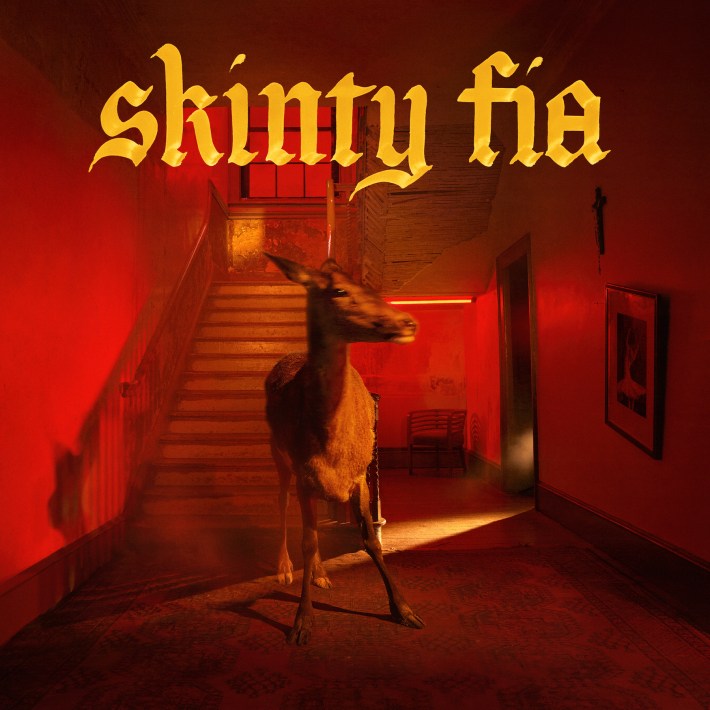- Partisan
- 2022
Fontaines D.C.'s new album begins with a quote from a gravestone sung by what sounds like a choir of ghosts. "In ár gCroíthe go deo" -- which translates to "In Our Hearts Forever" in Irish -- was to be engraved on an Irish woman's tombstone in London, but her family's request was initially denied by the governing authorities. "It's just the heartfelt message, but the Church of England itself ruled that it was … at risk of being perceived as a political slogan," Grian Chatten told Rolling Stone. "So they refused to allow the Irish language to exist on an Irish person’s gravestone."
The righteously angry song Fontaines wrote in response matches those eerie vocal harmonies with tense bass, nervy percussion, and, eventually, pounding drums. "Gone is the day, gone is the night, gone is the day," Chatten recites with smoldering restraint, holding back a fire he soon lets loose in the wailing outbursts in between. The music keeps perpetually winding up until the end, only releasing the nervous energy in fleeting fits and starts. After six minutes of this, it feels like Fontaines have collectively willed the epitaph onto the stone through sheer indignation -- and indeed, upon emerging from the studio they found out the family's request had been granted after all.
"In ár gCroíthe go deo" is a gripping introduction that conveys two important truths about Fontaines' new album Skinty Fia -- another Irish phrase, this one an expletive meaning "the damnation of the deer." One, these guys have been getting deeply in touch with their Irish heritage since relocating from their native Dublin to London during the pandemic, grappling with the ways their culture manifests itself abroad. Two, they've solved the problem facing every band that initially trades on the boundless energy of youth: How do you stay engaging once that initial burst of vigor levels off into something like grownup stability?
Fontaines rocketed out of Dublin with the kind of combustible energy you can't fake -- five rambunctious young pub intellectuals bashing away at their instruments, part Strokes and part Pogues, helmed by a singer who leaned into his vowels with a blaring force rarely heard since Liam Gallagher. They funneled all their deep thoughts about culture into tight little rock songs with darkness around the edges and played them with just the right amount of aggressive bluster, in the process becoming a living monument to a city that was rapidly slipping away. Maybe Grian Chatten's tongue was in his cheek when he announced, on the very first song, "I'm gonna be big!" But he wasn't wrong.
In the three years since Fontaines dropped their instant-classic debut album Dogrel, they've never really stopped getting bigger. They toured relentlessly behind that album and won over thousands of devotees in the process. In the midst of that endless blur of gigs, they somehow recorded a second album, 2020's A Hero's Death, which immediately announced Fontaines as a band that would not be simply repeating their hit debut ad infinitum. Despite its more inward, meditative posture, LP2 elevated the band into new realms of international prestige, including American alternative radio airplay and a Grammy nomination for Best Alternative Music Album. (They lost to the Strokes, but I like their chances in 2039.)
On Skinty Fia, Fontaines seize their moment with their loosest, most exploratory batch of songs to date. A Hero's Death was too strong to be slagged off as a sophomore slump -- any album with highlights as raucous as "Televised Mind" and "A Hero's Death" is a keeper -- but it felt like a transitional release from a band figuring out its place in the world. Fontaines were lost and weary after so much time on the road, and you could feel the weight of all that exhaustion and uncertainty in the music. They were seemingly determined to push beyond the boundaries of their initial sound, sometimes undermining their own strengths for experimentation's sake. This third LP merges that adventurous spirit and pervasive gloom with the catchy immediacy of Fontaines' debut -- a combination that bodes well for the band's future.
But let's not get ahead of ourselves because the band's present is very much worth celebrating. After that grand opening statement, Skinty Fia takes many more surprise turns without ever ceasing to sound like the unmistakable work of these five lads from Dublin who emerged so raw yet so fully formed. Along the way there are a handful of guitar-pop gems subtly powered by Conor Deegan's bass: the bright yet ominous character study "Jackie Down The Line," the darkly infectious tribute to Ireland "I Love You," its counterpart "Roman Holiday" chronicling Chatten's eagerness to discover London as an Irish expat. Bass is even more prevalent on the stunning "Skinty Fia," which imagines the Cure recording "Fascination Street" during the late '90s electronica boom.
I'm not sure I hear much of the influence of Primal Scream's XTRMNTR as cited by the band, but you can glimpse a bit of it in the title track's noisy swirl -- especially arriving right after "The Couple Across The Way," a ballad that observes a dysfunctional romance from afar, set to nothing but an old accordion. (It's like the spaghetti scene from Lady And The Tramp filtered through Rear Window.) While that song is about a neighboring couple's shouting matches, Chatten casts at least as much suspicion on his own tame romantic commitment. "I'll be your dog in the corner," he bleats, as if drowning in a quagmire of despair, on a song named for the famed Russian novelist Vladimir Nabokov -- as if you'd expect anything less from such voracious readers and old souls. (Lest you assume Chatten is the headiest Fontaines member by default, "Nabokov" was composed and titled by guitarist Conor Curley.)
Fontaines have refined their skill for arrangements to an impressive extent. Over and over again on Skinty Fia they build with nuance and texture over radically simple foundations. Many of the songs toggle between just two chords -- a move you can make when you have a singer as arresting as Chatten. The simplicity does not always pay dividends, though. Some of the more droning and repetitive tracks feel under-developed -- especially "How Cold Love Is," on which Chatten renders his voice as a bleary croak and repeats the title ad nauseam. But even those offer some kind of hypnotic appeal when you're in Fontaines' headspace, and in some sense those dirges are the purest distillation of the band's current less-is-more ethos. Their restraint is admirable for such a young group.
In that Rolling Stone interview, Chatten summed up the album's themes by explaining what the phrase "skinty fia" means to him: "It sounds like mutation and doom and inevitability and all these things that I felt were congruous to my idea of Irishness abroad. Like if you go to Boston, that expression of Irishness. That’s skinty fia to me. That’s that mutation. That’s a new thing. It’s not unlicensed and it’s not impure. Just because it's diaspora, it's still pure. It's just a completely new beast." I love that quote, and I love the album that embodies it. So much history is wrapped up in Fontaines D.C. -- musical, literary, political -- but it has mutated into something distinct and compelling. This was true before they moved away from Dublin, and it has become ever truer as they've left their homeland behind.
Skinty Fia is out 4/22 on Partisan.







